Noroît Blu-ray Movie
HomeNoroît Blu-ray Movie 
Noroît (une vengeance) / Blu-ray + DVDArrow | 1976 | 145 min | Not rated | No Release Date
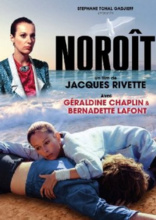
Price
Movie rating
6.2 | / 10 |
Blu-ray rating
| Users | 0.0 | |
| Reviewer | 3.5 | |
| Overall | 3.5 |
Overview
Noroît (1976)
On an island beach a woman vows to avenge her brother's death at the hands of a pirate leader. With help the woman spies on the pirates and then gets a job as bodyguard to the pirate leader.
Starring: Geraldine Chaplin, Bernadette Lafont, Kika Markham, Humbert Balsan, Babette LamyDirector: Jacques Rivette
| Foreign | Uncertain |
| Drama | Uncertain |
| Romance | Uncertain |
| Fantasy | Uncertain |
| Adventure | Uncertain |
Specifications
Video
Video codec: MPEG-4 AVC
Video resolution: 1080p
Aspect ratio: 1.85:1
Original aspect ratio: 1.85:1
Audio
French: LPCM Mono
Subtitles
English
Discs
Blu-ray Disc
Two-disc set (1 BD, 1 DVD)
DVD copy
Playback
Region A (B, C untested)
Review
Rating summary
| Movie | 3.5 | |
| Video | 4.0 | |
| Audio | 4.0 | |
| Extras | 0.0 | |
| Overall | 3.5 |
Noroît Blu-ray Movie Review
Reviewed by Jeffrey Kauffman May 30, 2017Note: This film is available as part of
The
Jacques Rivette Collection.
According to several sources Cahiers du cinéma is the oldest publication devoted to film still being published. This venerable journalistic
institution was founded in the early fifties by André Bazin, Jacques Doniol-Valcroze and Joseph-Marie Lo Duca and soon employed a coterie of
intellectuals who would ultimately go on to redefine first French film and finally world cinema itself. Among the now legendary names associated
with
Cahiers du cinéma are Éric Rohmer (the magazine’s first editor), Jean-Luc Godard, François Truffaut and Claude Chabrol. A 1954 article
by
Truffaut is often credited with opening the analytical floodgates for what later became known as “auteur theory”, and as should already be evident
given the names listed above, several of the writers employed by Cahiers du cinéma went on to become foundational figures in the
movement known as
Nouvelle vague, the French New Wave. It’s perhaps a little strange, then, that the name of Jacques Rivette hasn’t quite penetrated the
typical American filmgoer consciousness in the same way that (especially) Godard and Truffaut have, since Rivette began writing for the magazine
as
early as 1953 and in fact became its editor around a decade later. Rivette was also reportedly the first writer for the magazine later associated
with
the French New Wave to actually matriculate into feature film making, with his Paris Belongs to Us. That film reportedly began production in 1958, well before François Truffaut’s The 400 Blows came out in 1959 and/or Jean-Luc Godard’s
Breathless appeared in 1960, though it wasn’t finished and
screened until 1961, perhaps robbing Rivette of some bragging rights which would have otherwise been his.
Like some of his (future) New Wave
counterparts, Rivette wasn’t especially pleased with the mainstream French film industry of the 1950s and also like some of his cohorts he tended
to
lionize larger than life Hollywood directors like Alfred Hitchcock and John Ford. As structurally innovative as Godard has been, it’s arguable that in
some ways Rivette was even more anarchic in his approach toward “traditional” filmmaking, introducing some almost gargantuan running times
while also letting his casts (which were often almost absurdly large) to improvise their way through whole sequences. If Godard’s approach toward
deconstruction might be thought of as often a post-production technique, Rivette attacked some of the presumptions of less ambitious filmmakers
from a more foundational perspective, questioning the actual production process itself. This new collection from Arrow gathers together three
interesting efforts from Rivette spanning the years from 1976 to 1983. The first two films in this set, Duelle and
Noroît, were initially meant to be part of a four part series wherein Rivette sought to once again reinvent film “grammar”, though the
series met an unexpected ending when Rivette suffered a debilitating breakdown on the set of the proposed third film (which somewhat confusingly
was initially supposed to be the first to be released and which rather enticingly
would
have starred Albert Finney and Leslie Caron). Rivette’s psychological turmoil made the ultimate follow up production of Merry-Go-Round extremely troubled, as evidenced by the fact that filming
began
in 1978 but wasn’t completed until 1981 (with the film not getting an official theatrical release until a couple of years after completion).
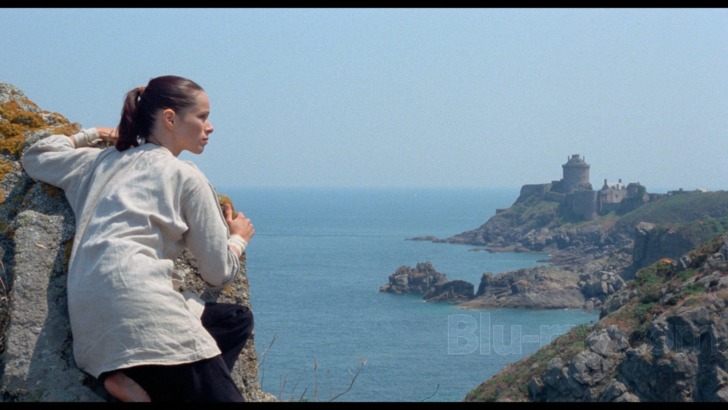
In a film by any lesser director — say, someone of the caliber of Ed Wood — the fact that a supposed corpse is breathing, and rather heavily at that, might be enough to put the kibosh on the entire outing. Noroît, as patently odd as it almost always is, somehow survives this seemingly debilitating event without much problem, though some cynical viewers may in fact be giggling a little as Morag (Geraldine Chaplin, effortlessly segueing between French and English) laments over the death of her brother Shane, whose supposedly lifeless body lies washed up on a rather gorgeous beach in Brittany. While the implication might initially be that Shane has drowned, it turns out he’s been killed by a female pirate named Giulia (Bernadette Lafont) who has made this isolated getaway her own private Treasure Island .
Renny Harlin’s collaboration with his then wife Geena Davis, Cutthroat Island, may have soured a lot of folks on films featuring female pirates, but Noroît is decidedly less “historical” than a lot of pirate films, seeming (as a lot of Rivette films do) to exist in a timeless realm where any given “era” may be nothing more than a passing fad. As Noroît’s subtitle une vengeance may hint at, the film is actually less concerned with the whole pirate aspect than it is in Morag exacting comeuppance on Giulia and her band of brigands. To that end, Morag has placed a spy of sorts in Giulia’s camp, a woman named Erika (Kika Markham). (An early rather shocking scene which more or less comes out of nowhere documents Erika taking one of the pirate gang out with several well placed whacks to the head with an oversized rock.)
That old adage says “revenge is a dish best eaten cold,” but Rivette seems to posit a kind of corollary, that too much heat can end up burning the one expecting to do the consuming. From a narrative standpoint, Noroît is actually almost surprisingly accessible, even if the overall context of everything is left on the diaphanous side (apparently even for the actors, as evidenced by Jonathan Rosenbaum's recounting of a conversation he had with Geraldine Chaplin where she confessed to having no clue as to what was going on in the film). In that way, watching this film might be akin to joining a long running soap opera years into its production, where relationships are already fraught with angst though you may not be quite sure exactly why.
Noroît Blu-ray Movie, Video Quality 
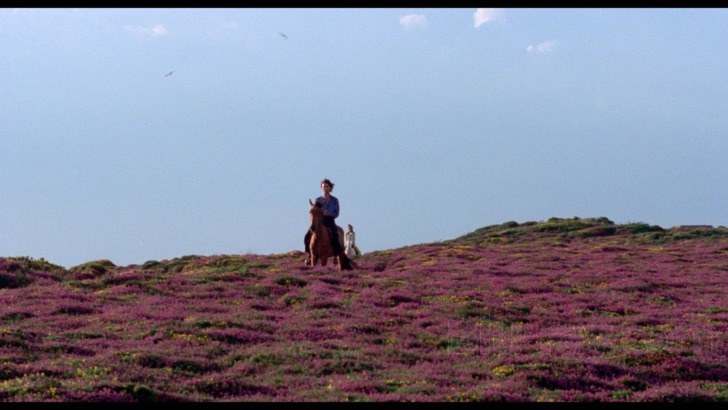
Noroît is presented on Blu-ray courtesy of Arrow Academy with an AVC encoded 1080p transfer in 1.85:1. Arrow's insert booklet contains this information on all three films in the Jacques Rivette set:
The original camera negatives were scanned, graded and restored at 2K resolution. The majority of the picture restoration work was conducted on Diamant Film Restoration systems, with Phoenix and Flame software used on selected sequences.Noroît is graced with what are probably inarguably the most scenic locations of the three films in this set (Jonathan Rosenbaum mentions the cliffside fortress was also used in The Vikings), and when things venture outside (which they often do), the palette is fresh and vivid looking and depth of field is often quite excellent. While close-ups are still relatively few and far between (as discussed in the Duelle Blu-ray review), there actually is often some fine detail to be seen even in midrange and wide range moments in many of the outdoor shots simply because Rivette typically frames things with some of the stone battlements at the forefront of the frame, and so things like rock textures or even lichens can be spotted quite easily. There's still some variability at play in terms of overall clarity and especially grain resolution (contrast screenshot 5 with other outdoor shots for just one example, though this same kind of fuzziness intrudes on select interior shots at times as well, as can be seen in screenshot 17). Some of the more unique stylistic elements, like Giulia's bright purple pantsuit or some other vivid costume colors (see screenshot 9) pop really nicely whether indoors or outdoors.
Picture issues such as dirt, debris and scratches, torn frames, damaged splices, instability and mould were all corrected or minimised.
Colour grading was carried out using a P3 DCI colour space. 35mm original prints were used as a visual reference throughout by the colourist.
The original magnetic reels were too damaged for use, so the soundtracks were sourced from the original optical sound negatives and, in some cases, digital Betacam tapes produces in the 1990s. The majority of this work was carried out by L.E. Diapason in Paris.
Noroît Blu-ray Movie, Audio Quality 
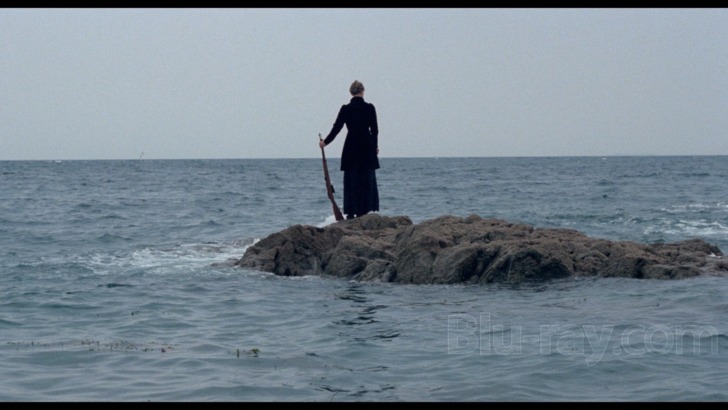
Noroît's LPCM Mono track (in English and French with English subtitles for the French portions) exhibits some of the same boxiness and brittleness in the high end that I mentioned in the Duelle Blu-ray review, a tendency which is apparent from the get go with the sounds of the ocean lapping at the shore as the film opens. This film's score, by a rather anachronistic jazz combo that features a lot of percussion and swooping string effects, can sound a little bright and boxy at times, and there's some actual distortion, albeit very fleetingly, at some higher amplitudes, including some dialogue moments. This film suffers from some of the worst prioritization of the three when actors are speaking while music is playing (all recorded live), but at least some of the time these moments are in French, meaning there are subtitles to help decipher what's being said.
Noroît Blu-ray Movie, Special Features and Extras 
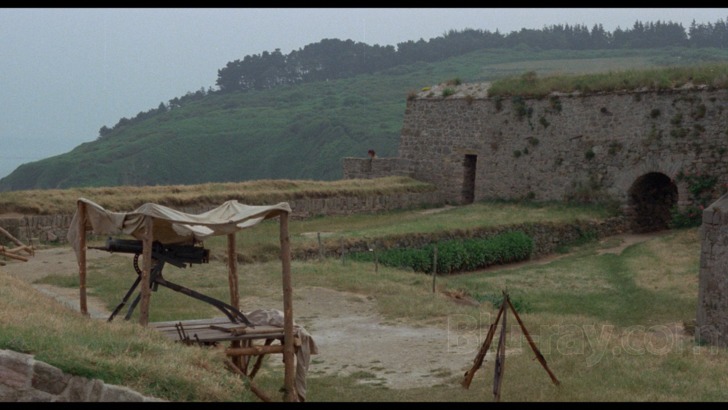
This disc has no supplementary material.
Noroît Blu-ray Movie, Overall Score and Recommendation 
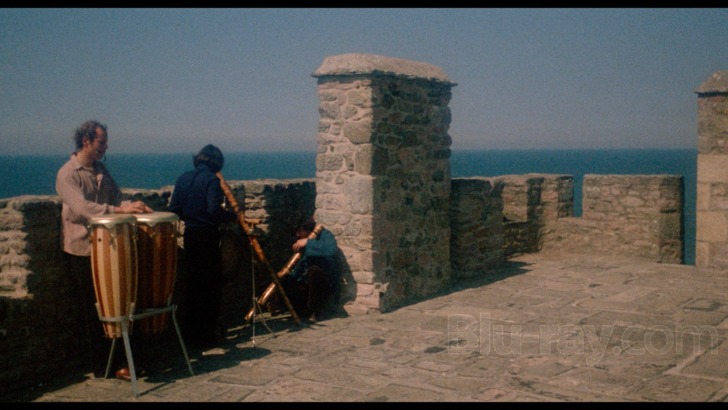
Noroît is ostensibly based on the Jacobean play The Revenger's Tragedy, long thought to be the work of Cyril Tourneur (as evidenced by this film's credits attribution), but now thought to be the work of Thomas Middleton. Rivette slices and dices the source material so vigorously that some might argue no adaptive traces are even left, but the film is sui generis in any case, a rather odd but at times quite effective depiction of an epochal battle of wills. This is an incredibly scenic outing one way or the other, and while there are some variabilities at play, this release's video component is largely appealing. As with many Rivette offerings, Noroît won't be to everyone's taste, but for those wanting something completely unique if not always completely satisfying, Noroît comes Recommended.
Similar titles
Similar titles you might also like
(Still not reliable for this title)

Duelle
Duelle (une quarantaine)
1976

Merry-Go-Round
1981

Les visiteurs du soir
The Devil's Envoys
1942

Sumurun
1920

Phantom
1922

Die Nibelungen: Siegfried
1924

Beauty and the Beast
La belle et la bête
1946

Die Nibelungen: Kriemhild's Revenge
Die Nibelungen: Kriemhilds Rache
1924

The Big Blue 4K
1988

The Mad Fox
恋や恋なすな恋 / Koi ya koi nasuna koi
1962

Orpheus
Orphée
1950

Fox and His Friends
Faustrecht der Freiheit
1975

Nights of Cabiria
Le notti di Cabiria
1957

La vie de Jésus
The Life of Jesus
1997

The Lovers
Les amants
1958

Masculin Féminin
1966

Full Moon in Paris
Les nuits de la pleine lune
1984

Millennium Mambo
千禧曼波 / Qian xi man bo
2001

Claire's Knee
Le genou de Claire
1970

Asako I & II
寝ても覚めても / Netemo sametemo
2018